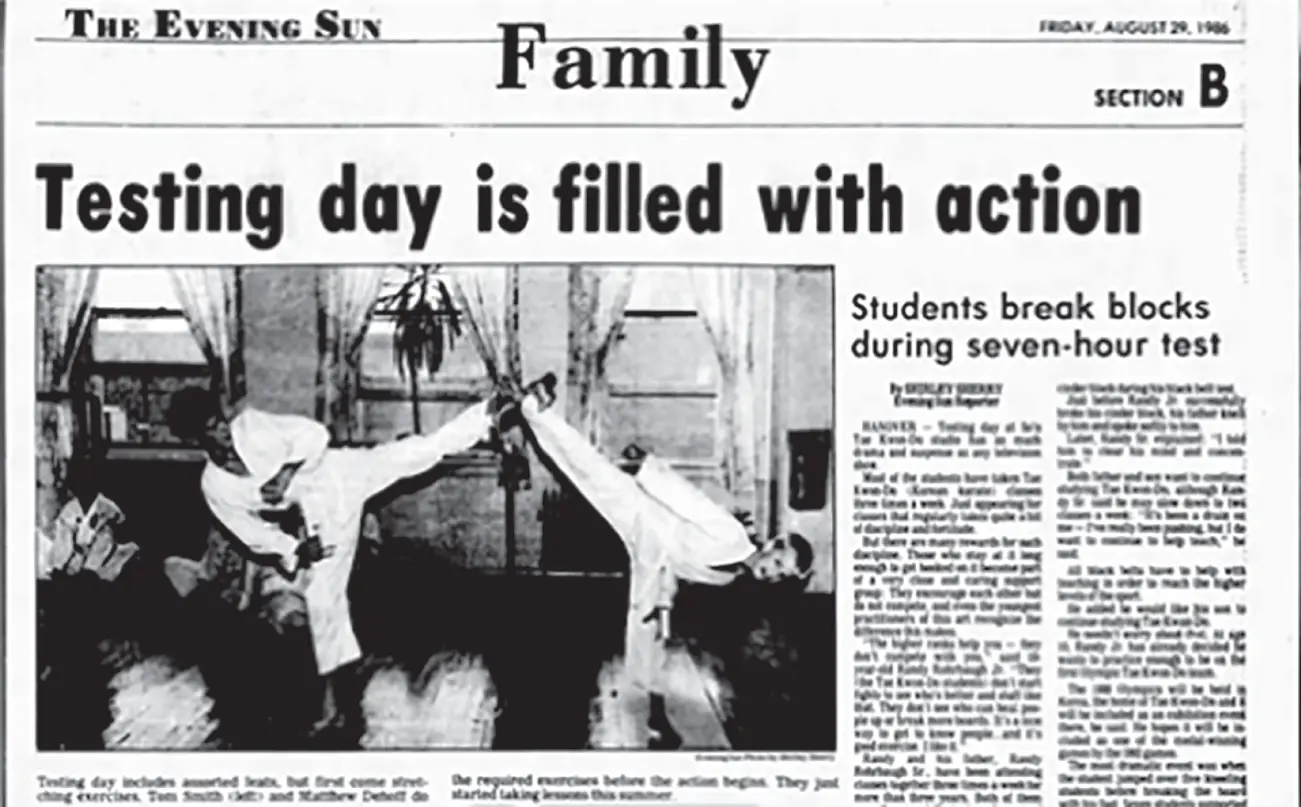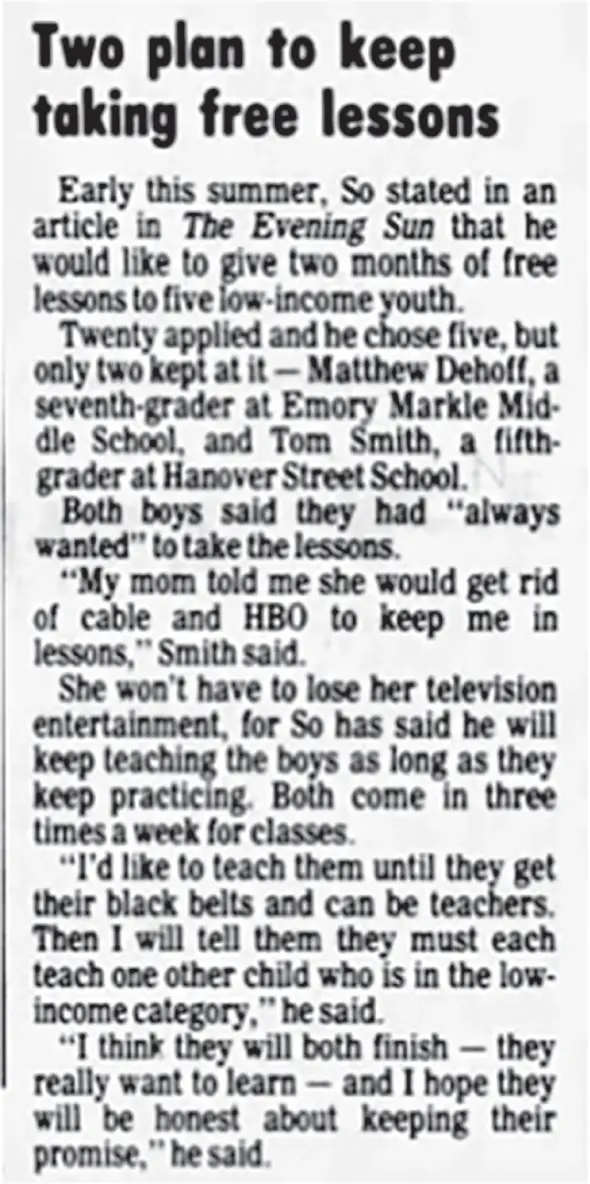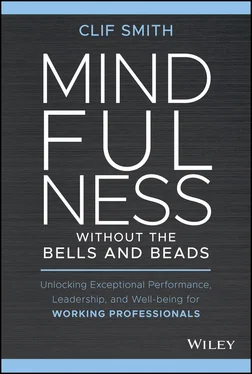Three Skills That Changed My Life
The first skill Master So taught us was to recognize, embrace, and be mindful of the sensations and thoughts associated with fear and then still step forward. “What does fear feel like in the body?” and “How does fear show up in the mind?” were questions Master So posed to us. We learned to exercise this skill each time we approached the sparring mat and faced a stronger or more advanced opponent. Notice the fear, and move forward. Notice the hesitation, and move forward. Notice the heart racing, and move forward. It was by turning toward and embracing fear that we learned we could do anything, whether fear was present or not.

FIGURE 1.1 PICTURE OF ME AT SO'S TAE KWON DO TAKING A TEST FOR MY NEXT BELT LEVEL. I'M THE KID ON THE RIGHT ALTHOUGH THE CAPTION SAYS LEFT.
Source: The Evening Sun, 29 August 1986. © Shirley Sherry – USA TODAY NETWORK.
The second skill Master So taught was to be mindful of unhelpful internal thoughts, beliefs, and stories and still move forward despite their presence. These are the automatic thoughts that tell us we aren't good enough, tall enough, or smart enough. They often claim we don't belong, some achievements are only for others, or other people have it better and that's why they're successful, keeping us in a victim mentality. That unhelpful inner dialogue also includes rumination and worry, far in excess of any helpful contemplation of how to face and overcome a challenge or difficult situation. We learned to exercise this skill each time we had to break wooden boards and eventually cement blocks with specific strikes, such as hammer fist or knife hand strikes. As a young boy about to attempt these types of breaks, my mind would race with thoughts of “I can't do this. There are too many. It's going hurt.” Notice the unhelpful thinking; do the action anyway. Each time we did this, we reinforced our ability to move forward despite a weak and fearful mind, which eventually gave way to a stronger one.

FIGURE 1.2 EXCERPT FROM THE SAME ARTICLE DISCUSSING THE CONTEST FOR LOW-INCOME KIDS AND MY MOM'S OFFER TO CUT CABLE AND HBO SO I COULD KEEP TAKING LESSONS.
Source: The Evening Sun, 29 August 1986. © Shirley Sherry – USA TODAY NETWORK.
This skill of becoming aware of unhelpful thoughts and not letting them affect my actions was reinforced by something my Uncle Howard said when we were fishing one afternoon. He said, “Tommy (that's what everyone called me back then), one thing I love about fishing is that you can cast your line into the water and just let all your worries flow down the stream.” At the time, I did not fully grasp the wisdom of this comment. What's most surprising about it, as I've looked back on that interaction, is that the comment was uttered by a mountain man with a big heart, who had lived his entire life in an area outside Gettysburg, Pennsylvania, called “the Narrows.” He shared an insight with me that he didn't have to travel to an exotic land to discover, didn't have to kiss the feet of a guru to gain access to, and didn't have to take on the demeanor, political views, or values of someone else to be considered worthy of learning it. He shared that nugget with me not knowing if I was ready to hear it and not expecting anything in return. He planted the seed and helped me learn to notice that the world has lessons to teach if we only pay attention. And that wasn't the only nugget of wisdom fishing yielded in support of this skill.
Every time we went fishing, we did something called “catch and release.” No, it wasn't a controversial immigration tactic; it was what we did every time we caught a fish. Catch a bass, release it. Catch trout, release it. You get the picture. I turned this phrase into a way to practice the second skill outside the martial arts studio.
The Catch and Release technique became (and remains) one of my most powerful tools for noticing and letting go of unhelpful internal dialogue and fear-driven thinking. Suddenly, I could do the things I was afraid of and attempt the things my mind told me I couldn't do. I would “catch” myself buying into an unhelpful thought and “release” it and any automatic impulse to believe or follow it. “I'm not good enough.” Catch and Release it. “I'll never learn this.” Catch and Release it. “If only we were rich, then we'd be happy.” Catch and Release it. This one technique alone can massively change your life.
The third skill we learned came as a direct outcome of Master So requiring we regularly practice focused attention meditation, which I describe in Chapter 6. This exercise cultivated an ability to focus our attention at will and keep it where we wanted it to be, even under the stress and duress of sparring. I must admit this skill was much easier to learn back in the mid-1980s before everyone had a supercomputer in their pocket and access to entertainment 24 hours a day, 7 days a week.
Just as fishing yielded insights and skills associated with mindfulness, I was able to practice a manner of focused attention meditation throughout my teenage years through another outdoor activity. I had some amazing uncles, cousins, and family friends who would take me hunting regularly. Sitting in the woods in 30-degree temperatures, with only your breath keeping you company, while waiting for a deer to step into a clearing, is a fantastic way to cultivate the power of concentration (as well as patience and the subtle art of not complaining).
Once a deer does step into your field of view, your body is immediately flooded with adrenalin, your heart starts pounding out of your chest, and yet you must remain calm, quiet, and steady if you want that deer to feed your family for a few months.
Those three core mindfulness skills, as well as some insights I learned along my journey, became crucial when opportunities crossed my path as you'll soon see.
That first skill of being aware of fear and moving forward despite that fear became extremely useful early in my career. When I flew to Fort Jackson, South Carolina, the day I left for the Army, it was the first time I ever flew in a plane. I quickly discovered I was absolutely terrified of flying and heights. This was the kind of terrifying experience when you can hardly breathe, you're white-knuckling the arms of the seat, and sweat beads up on your forehead. I can attest that flight attendants ask you if you are okay when you display that level of fear.
Thankfully, I got through that initial flight but realized this level of fear of flying was something I would want to overcome to fully experience this life and our world. So, when I had an opportunity to go to Airborne School and “learn” to jump out of airplanes, I leaned into that fear and volunteered. It was a profound experience to be totally consumed by fear in my body and thoughts, still jump (fall!) out of that plane, and be okay on the other side of the experience. When you learn you can feel high levels of fear and still consistently move forward despite it, no goal is out of reach.
The second skill—being aware of unhelpful inner dialogue/self-talk and not allowing it to dissuade me or negatively impact on outcomes—came to the fore when I was considering reenlisting in the Army as my first term was coming to a close. Of the jobs available, one jumped out at me as interesting: linguist. The Army had a significant need for speakers of a number of languages, including Russian, Vietnamese, Chinese, Arabic, Korean, and a few more. It was the Chinese linguist position that caught my eye.
Читать дальше














